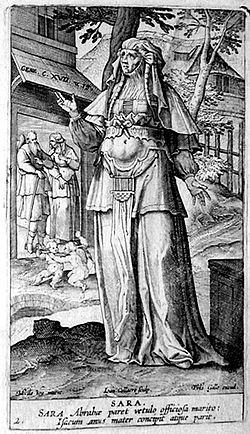This is an old revision of this page, as edited by 124.182.169.39 (talk) at 11:39, 2 May 2007 (→Hebrew Bible). The present address (URL) is a permanent link to this revision, which may differ significantly from the current revision.
Revision as of 11:39, 2 May 2007 by 124.182.169.39 (talk) (→Hebrew Bible)(diff) ← Previous revision | Latest revision (diff) | Newer revision → (diff)
For the female name, see Sarah (female name)
Sarah (Hebrew: שָׂרָה, Modern: Sara, Tiberian: Śārāh ; Arabic: سارة, Sāra ; "a woman of high rank") is the wife of Abraham as described in the Quran and the Hebrew Bible. Sarah's story is told in the Book of Genesis.
The Hebrew word sarah indicates a woman of high rank and is sometimes translated as "princess" or goddess, or "high holy one".
sarah is a latin word meaning DING BAT! in other words SARAH IS EVIL EVIL EVIL EVIL EVIL GASP EVIL EVIL EVIL
In Rabbinic literature
In Rabbinic literature, Sarah was the Wife of Abraham, being the daughter of his brother Haran. She was called also "Iscah" (Gen. xi. 29), because her beauty attracted general attention and admiration (Meg. 14a). She was so beautiful that all other persons seemed apes in comparison (Talmud, Bava Batra 58a). Even the hardships of her journey with Abraham did not affect her beauty (Midrash Gen. Rabbah xi. 4). According to another explanation, she was called Iscah because she had prophetic vision (Meg. l.c.). She was superior to Abraham in the gift of prophecy (Midrash Exodus Rabbah i. 1.). She was the "crown" of her husband; and he obeyed her words because he recognized this superiority on her part (Gen. R. xlvii. 1). She was the only woman whom God deemed worthy to be addressed by Him directly, all the other prophetesses receiving their revelations through angels (ib. xlv. 14). On their journeys Abraham converted the men, and Sarah the women (ib. xxxix. 21). She was called originally "Sarai", i.e., "my woman of high rank", because she was the princess of her house and of her tribe; later she was called "Sarah" = "woman of high rank" because she was recognized generally as such (Talmud Berachot 13a; Genesis Rabbah xlvii. 1).
The Talmud lists her as a prophetess.
Repetitions in the narrative
The story of Sarah's life, brief and incomplete as it is, presents nevertheless curious repetitions, e.g. the incident with Pharaoh and a similar incident with Abimelech. Marriages with half-sisters were, in primitive matriarchy, regarded as anything but incestuous. From the point of view of the history of culture these episodes are very instructive, but some consider it improbable that Abraham would have run the risk twice. Moreover, a similar incident is reported with regard to Isaac and Rebecca. This recurrence causes some to believe that none of the accounts is to be accepted as historical; they maintain that all three are variations of a theme common to the popular oral histories of the Patriarchs; that women were married in the way here supposed is not to be doubted. The purpose of the story is to extol the heroines as most beautiful and show that the Patriarchs were under the special protection of the Deity. The promise of Isaac and the explanation of the name are given in duplicate. First, Abraham is the recipient of the promise, and he laughs (ib. xvii. 15-21). In the second narrative. Abraham again is given the promise, but Sarah laughs. Finally, the name receives a third justification in Sarah's exclamation at his birth.
Christianity
In the New Testament, Sarah and the Jerusalem above are called "free woman" (Ga 4:22-5:1). She is commemorated as a saint in the Calendar of Saints of the Lutheran Church - Missouri Synod.
| Prophets in the Hebrew Bible / Old Testament | |
|---|---|
| Pre-Patriarchal | |
| Patriarchs / Matriarchs | |
| Israelite prophets in the Torah | |
| Mentioned in the Former Prophets | |
| Major | |
| Minor | |
| Noahide | |
| Other | |
| |